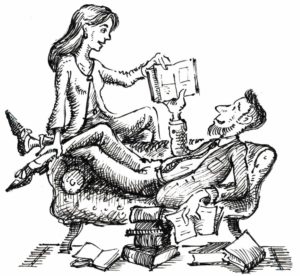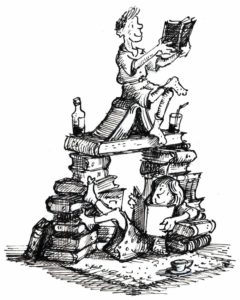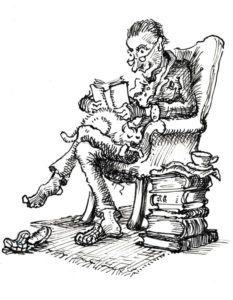1950s America: Peace & Prosperity
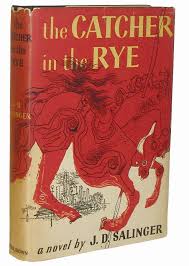 The Catcher In The Rye [1951]
The Catcher In The Rye [1951]
J.D. Salinger (1919-2010)
The journey of a 1950s, middle-class, rebellious and troubled teenager from naivety to adulthood, narrated in a subjective style that reflects accurately the teenage speech of the time. It was a controversial book for many years, now of iconic status.
The Caine Mutiny [1951]
Herman Wouk (1915-2019)
Captain Queeg, paranoid, neurotic, incompetent, and in charge of an out-of-date ship; Lt. Tom Keefer, an embittered intellectual who cranks up the tension; Lt. Officer Maryk, excellent young career man, but wet behind the ears and unable to cope with the mounting tension.
From Here To Eternity [1951]
James Jones (1921-1977)
Most men are enlisted for life, complain bitterly, but in fact love the life, which in some ways they shape to their own desires. The book accurately depicts the pre-Second World War American army, and its publication caused offence to many readers with its frank language and preoccupation with sex.
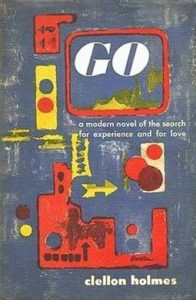 Go [1952]
Go [1952]
John Clellon Holmes (1926-1988)
A roman- à-clef, the first novel about the beat generation set in 1940s and 1950s Manhatten. An underworld of drug-fuelled parties, bars, clubs and free love.
Invisible Man [1952]
Ralph Ellison (1914-1994)
The ‘hero’ is a Negro raised in poverty in the South but given the opportunity of education; Dostoevsky’s Notes From Underground was used as a model. A brilliant student, he is sold down the river by his own people, then co-opted and exploited by the Communist movement.
Go Tell It On The Mountain [1953]
James Baldwin (1924-1987)
It’s tough to be a Negro in Harlem in the 1930s. Father Gabriel is a preacher who believes everything is sinful, so his four children are strictly controlled. A story of how unbearable terrors in the parents’ Southern youth affected the whole of their life.
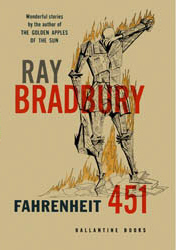 Fahrenheit 451 [1953]
Fahrenheit 451 [1953]
Ray Bradbury (1920-2012)
Books are banned, and Montag is amongst those firemen on emergency call to burn them, often along with the houses, sometimes even the residents. He is unhappy at home, and Clarisse, a young girl, disturbs him and makes him think. The first hardback edition was bound in asbestos.
The Light In The Forest [1953]
Conrad Richter (1890-1968)
John Butler, a white boy, was captured and raised by Indians from babyhood, but as a result of a treaty has to be returned to his birth parents at fifteen, to a life he neither understands nor likes.
The Blackboard Jungle [1954]
Evan Hunter (1926-2005)
Hunter wrote detective stories under the pseudonym Ed McBain. This, his first novel, deals with conditions in New York public schools. Rick Dadier wants to teach, knows the kids will be tough, but feels his navy service will help. After rescuing a fellow teacher from rape, he is pursued by a teenage gangster.
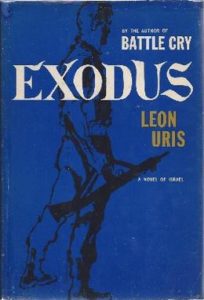 Exodus [1954]
Exodus [1954]
Leon Uris (1928-2003)
Two Americans meet in Cyrus after 1945, and work with the refugees in squalid camps as journalist and nurse. Ultimately the ship Exodus takes them to Palestine, carrying both legal and illegal immigrants, where they farm successfully the barren land.
The Man In The Grey Flannel Suit [1955]
Sloan Wilson (1920-2003)
A post-Second World War family is struggling for upward mobility. Thomas Rath is striving for the ‘good life’, but it entails becoming a yes-man and working away from the family in New York.
Andersonville [1955]
MacKinlay Kantor (1904-1997)
Documents to depict both prison life and his human portraits are used in this historical novel; fictional local residents round out the picture. Andersonville Prison, where 13,000 men died, is now designated a memorial to the nation’s prisoners of war. Vividly written, the degradation is tragic, yet the men’s dignity could not be destroyed.
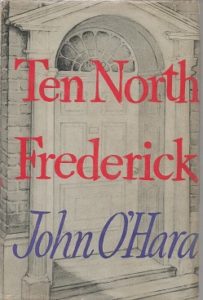 Ten North Frederick [1955]
Ten North Frederick [1955]
John O’Hara (1905-1970)
Joe Chapin was a wealthy, small-town attorney whose personal and professional life was outwardly successful; however, we learn of his deceit, secrecy, insensitivity, and of his death by alcohol.
Peyton Place [1956]
Grace Metalious (1924-1964)
The social anatomy of a small community is disclosed, examining the lives of its people – their passions, vices, ambitions, defeats, secret hopes, kindnesses, struggles and often their courage.
Seize The Day [1956]
Saul Bellow (1915-2005)
Middle-aged Tommy Wilhelm in one day has to face the truth about himself: a sloven, squanderer and loser, his rent due with no job. He passes a funeral and weeps: perhaps his life is about to change.
The Wapshot Chronicle [1957]
John Cheever (1912-1982)
St. Botolphs, Massachsetts, is the home of the Wapshot family: an unsuccessful father and practical mother, a matriarchal aunt controlling the purse strings, and two growing sons.
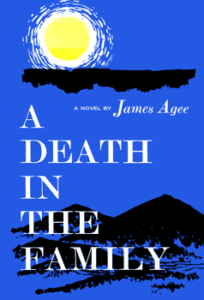 A Death In The Family [1957]
A Death In The Family [1957]
James Agee (1909-1985)
A dramatic tale of how families bond together at times of crisis. Incomplete when the author died and posthumously published, the book won a Pulitzer Prize.
On The Road [1957]
Jack Kerouac (1922-1969)
William Burroughs declared that this book “sold a trillion Levis and a million Espresso machines…” Sal Paradise, young and innocent, joins Dean Moriarty, a loser who uses anyone, on an exuberant ride across the U.S. He is the only one to stand by Dean.
Breakfast At Tiffany’s [1958]
Truman Capote (1924-1984)
The author’s most memorable character, Holly Golightly, sparkles. Holly is a teenage hillbilly who married an old veterinarian in Texas, and they now live in New York.
Lolita [1958]
Vladimir Nabokov (1899-1977)
Humbert Humbert, a pervert attracted to young girls, truly loves twelve-year old Lolita. Tame by today’s standards, sex scenes and gutter language are alluded to only. It is a comedic parody on trash, and left its mark in the relaxing of American censorship.
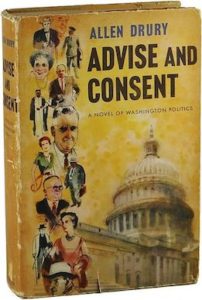 Advise And Consent [1959]
Advise And Consent [1959]
Allen Drury (1918-1998)
Washington’s political games revealed, with the details of the minds and motives of its statesmen – their public and private faces, ambitions, vanities, hopes and fears. Politicians of the time were thinly disguised in this anti-Communist diatribe.
The Sirens Of Titan [1959]
Kurt Vonnegut (1922-2007)
The richest, most depraved man on Earth is offered a chance to take a space journey to distant worlds with a beautiful woman at his side. Of course there is a catch…
A Separate Peace [1959]
John Knowles (1926-2001)
America’s participation in World War Two overshadows the summer term at Devon School. A challenge between Gene, an introverted intellectual, and Phineas, a handsome daredevil, goes wrong and evokes horror.
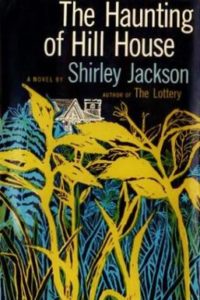 The Haunting Of Hill House [1959]
The Haunting Of Hill House [1959]
Shirley Jackson (1916-1965)
The stuff of dark nightmares, the best of her novels (though she was regarded more for her short stories), an exposé of how fear can make us our own worst enemy.
To Kill A Mockingbird [1960]
Harper Lee (1926-2016)
Lee explores the issues of race and class in the Deep South of the 1930s with compassion, eccentricity and humour. Considered by many to be the perfect novel, and a reading rite of passage.
Rabbit, Run [1960]
John Updike (1932-2009)
Harry Rabbit Angstrom, former high school basketball star, runs away from respectability and takes up with a prostitute, but has confused obligations. Fabulous sex scenes, cor.


